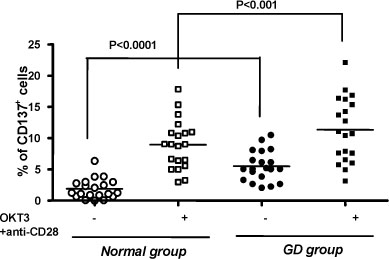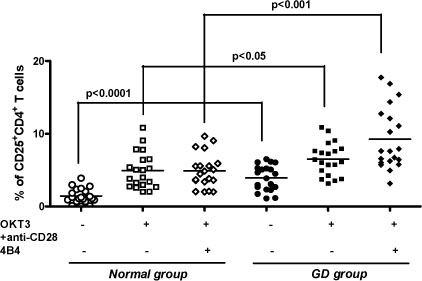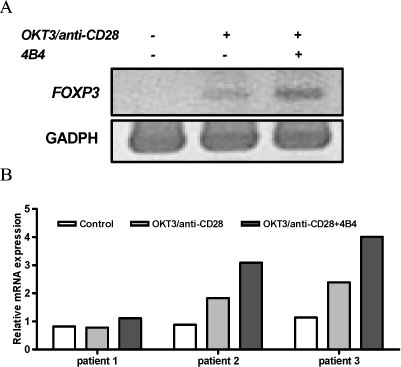J Korean Endocr Soc.
2007 Oct;22(5):332-338. 10.3803/jkes.2007.22.5.332.
Suppression of Pathogenic Autoreactive CD4+ T Cells by CD137-mediated Expansion of CD4+CD25+ Regulatory T Cells in Graves' Disease
- Affiliations
-
- 1Department of Internal Medicine, Ulsan University Hospital, Ulsan University of Collage of Medicine.
- 2Biomedical Research Center, Ulsan University Hospital, Ulsan University of Collage of Medicine.
- KMID: 1523102
- DOI: http://doi.org/10.3803/jkes.2007.22.5.332
Abstract
-
BACKGROUND: Graves' disease (GD) is an organ-specific autoimmune disease that is characterized by lymphocyte infiltration of the thyroid, which finally leads to follicular destruction. The CD4+CD25+ regulatory T cells are important for maintaining peripheral tolerance to self-antigens and impaired activity can cause autoimmune diseases. CD137 (4-1BB), a member of the tumor necrosis factor receptor superfamily and expressed on activated T cells, is a candidate molecule for a co-stimulatory role in autoimmune thyroid disease. In this study, we aimed to assay the frequency of CD4+CD25+ T cells in GD patients and to investigate the role of CD137-mediated costimulation in CD4+CD25+ T cells.
METHODS
The frequencies of the CD4+CD25+ T cells in the peripheral blood (PB) of GD patients were determined by flow cytometric analysis. After the CD4+CD25+ T cells were isolated from PB mononuclear cells (PBMC) of the GD patients using immunomagnetic beads, the functional activity of the CD4+CD25+ T cells was characterized by use of a proliferation assay. mRNA expression of Foxp 3 in the CD4+CD25+ T cells of the GD patients was observed by real-time RT-PCR.
RESULTS
In this study, we found that GD patients had a low proportion of CD4+CD25+ T cells (mean +/- SD; 1.47 +/- 0.31%) in PBMC as compared with normal subjects. CD137-mediated costimulation increased the expression of CD25 and Foxp 3 in CD4+ T cells in GD patients as compared with normal subjects. Moreover, the CD137-mediated costimulation also induced the proliferation of CD4+CD25+ T cells in GD patients, and the expanded CD4+CD25+ T cells could suppress other CD4+CD25- T cells in a co-culture.
CONCLUSION
These results suggest that the peripheral expansion of CD4+CD25+ T cells by CD137-mediated co-stimulation can suppress effector T cells and may be a potent therapy for Graves' disease.
Keyword
MeSH Terms
Figure
Reference
-
1. Mathis D, Benoist C. Back to central tolerance. Immunity. 2004. 20:509–516.2. Heufelder AE. Pathogenesis of ophthalmopathy in autoimmune thyroid disease. Rev Endocr Metab Disord. 2000. 1:87–95.3. Weetman AP. Autoimmune thyroid disease: propagation and progression. Eur J Endocrinol. 2003. 148:1–9.4. Salmaso C, Olive D, Pesce G, Bagnasco M. Costimulatory molecules and autoimmune thyroid diseases. Autoimmunity. 2002. 35:159–167.5. Croft M. Costimulation of T cells by OX40, 4-1BB, and CD27. Cytokine Growth Factor Rev. 2003. 14:265–273.6. Kim ES, Jung HW, Nam-Goong IS, Woo SJ, Choi JI, Kim YI. Expression of 4-1BB and 4-1BBL in Graves' disease. J Kor Soc Endocrinol. 2006. 21:116–124.7. Mittler RS, Foell J, McCausland M, Strahotin S, Niu L, Bapat L, Hewes LB. Anti-CD137 antibodies in the treatment of autoimmune disease and cancer. Immunol Res. 2004. 29:197–208.8. Foell J, Strahotin S, O'Neil SP, McCausland MM, Suwyn C, Haber M, Chander PN, Bapat AS, Yan XJ, Chiorazzi M, Hoffmann MK, Mittler RS. CD137 costimulatory T cell receptor engagement reverses acute disease in lupus-prone NZB x NZW F1 mice. J Clin Invest. 2003. 111:1505–1518.9. Sun Y, Lin X, Chen HM, Wu Q, Subudhi SK, Chen L, Fu XY. Administration of agonistic anti-4-1BB monoclonal antibody leads to the amelioration of experimental autoimmune encephalomyelitis. J Immunol. 2002. 168:1457. 1465.10. Seo SK, Choi JH, Kim YH, Kang WJ, Park HY, Suh JH, Choi BK, Vinay DS, Kwon BS. 4 1BB mediated immunotherapy of rheumatoid arthritis. Nat Med. 2004. 10:1088–1094.11. Roncarolo M, Levings MK. The role of different subsets of T regulatory cells in controlling autoimmunity. Curr Opin Immunol. 2000. 12:676–683.12. Shevach EM. Regulatory T cells in autoimmunity. Annu Rev Immunol. 2000. 18:423–449.13. Zwar TD, VAN Driel IR, Gleeson PA. Guarding the immune system: Suppression of autoimmunity by CD4CD25 immunoregulatory T cells. Immunol Cell Biol. 2006. 84:487–501.14. Morris GP, Kong YC. Interference with CD4+CD25+ T-cell-mediated tolerance to experimental autoimmune thyroiditis by glucocorticoid-induced tumor necrosis factor receptor monoclonal antibody. J Autoimmun. 2006. 26:24–31.15. Hori S, Nomura T, Sakaguchi S. Control of regulatory T cell development by the transcription factor Foxp3. Science. 2003. 299:1057–1061.16. Fontenot JD, Gavin MA, Rudensky AY. Foxp 3 programs the development and function of CD4+CD25+ regulatory T cells. Nat Immunol. 2003. 4:330–336.17. Fantini MC, Becker C, Monteleone G, Pallone F, Galle PR, Neurath MF. Cutteing edge: TGF-beta induces a regulatory phenotype in CD4+CD25- T cells through Foxp 3 induction and down-regulation of Smad7. J Immunol. 2004. 172:5149–5153.18. Saitoh O, Nagayama Y. Regulation of Graves' hyperthyroidism with naturally occurring CD4+CD25+ regulatory T cells in a mouse model. Endocrinology. 2006. 147:2417–2422.19. Ludgate M, Baker G. Inducing Graves' ophthalmopathy. J Endocrinol Invest. 2004. 27:211–215.20. Furugaki K, Shirasawa S, Ishikawa N, Ito K, Ito K, Kubota S, Kuma K, Tamai H, Akamizu T, Hiratani H, Tanaka M, Sasazuki T. Association of the T-cell regulatory gene CTLA4 with Graves' disease and autoimmune thyroid disease in the Japanese. J Hum Genet. 2004. 49:166–168.21. Liu H, Hu B, Xu D, Liew FY. CD4+CD25+ regulatory T cells cure murine colitis: the role of IL-10, TGF-b and CTLA-4. J Immunol. 2003. 171:5012–5017.22. Morris GP, Kong YC. Interference with CD4+CD25- T-cell-mediated tolerance to experimental autoimmune thyroiditis by glucocorticoid-induced tumor necrosis factor receptor monoclonal antibody. J Autoimmun. 2006. 26:24–31.23. Bettelli E, Dastrange M, Oukka M. Foxp 3 interacts with nuclear factor of activated T cells and NF-kappa B to repress cytokine gene expression and effector functions of T helper cells. Proc Natl Acad Sci. 2005. 102:5138–5143.
- Full Text Links
- Actions
-
Cited
- CITED
-
- Close
- Share
- Similar articles
-
- Regulatory T Cells and Allogeneic Transplantation
- Peripheral Generation of CD4+ CD25+ Foxp3+ Regulatory T Cells
- A Study on the Number of Circulating CD4+CD25+Foxp3+ Regulatory T Cells and CD4+CD25-Foxp3+ T Cells in Psoriasis
- IL-4 Induces CD4+CD25+ Regulatory T Cells from CD4+CD25- T Cells in Peripheral Blood
- Dynamic Frequency of Blood CD4+CD25+ Regulatory T Cells in Rats with Collagen-induced Arthritis






